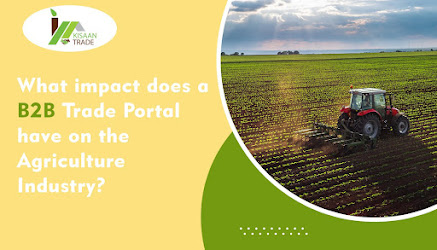What impact does a B2B trade portal have on the agriculture industry?
Businesses all over the world face new opportunities and challenges thanks to the Internet. New business relationships and new markets, businesses, and marketing paradigms have been made possible by e-commerce (EC). E-commerce, taken broadly, refers to all business dealings involving information technology. It includes everything that makes it possible for us to collect, produce, store, analyse, distribute, or otherwise use information electronically.
E-commerce entered the agricultural industry at the end of the 20th century, giving current customers another way to share product information and connect with a new customer base. Agribusinesses must practice incorporating Internet activities into their business model, which is a challenge they share with other businesses. Many agribusinesses have improved the marketing and trading of their products by utilising the benefits of e-business.
Agriculture E-commerce
Agriculture e-commerce refers to the type of trading model in which the purchasing and selling of agricultural goods and services is done electronically using computer systems connected by inter-network protocols and standards. The various parties agree to follow the standards, laws, and regulations governing the industry in their electronic business dealings. Agricultural goods are less standardized than manufactured goods. Standard grades make it easier to describe products, but location and time also have an impact on a commodity's price.
Agricultural e-commerce refers to any method of conducting agricultural business using electronic communications and computer technology, allowing trading partners to share a variety of data. Agribusinesses' interactions with each other and with customers through communication channels are transformed by agricultural e-commerce. In other words, technology is part of the larger fields of agriculture and information technology.
The agricultural supply chain has been characterized as being full of flaws that limit efficiency. E-commerce has a lot of room for growth in these areas. Agriculture is moving more and more towards e-commerce due to factors like the supply chain's high level of fragmentation, large trade volumes, and homogeneous products.
B2B E-Marketplace: A Case Study in Agriculture E-Commerce
According to a general definition of a B2B e-marketplace, within a certain transactional framework, suppliers and buyers are willing to exchange money and distribute goods and information using Internet standards and protocols. As electronic commerce expands quickly, there are an increasing number of online marketplaces.
An enterprise can realise a new business pattern with lower costs and a higher return by using the central dealing platform that the e-marketplace offers. Agribusinesses and farms can use third-party e-marketing, which is typically a business-to-business online marketplace for agricultural products. You can access classified ads, requests for quotes, or bids in your industry sector by signing up on a separate e-marketplace.
The owner of the business will typically classify B2B EC in one of three ways: as an e-distribution if it originates from the seller's side, an e-procurement if it originates from the buyer's side, or as an e-marketplace if it originates from an intermediary. Scholars have expanded the definition of the intermediary e-marketplace to encompass both e-procurement and e-distribution.
How does a B2B trade portal affect the agricultural sector?
Enhanced Efficiency: By streamlining the buying and selling process, B2B trade portals can help save time and effort on the negotiation and transaction management stages. For farmers and other industry participants, this can help lower costs and boost profitability.
Better Transparency: B2B trade portals can offer real-time data on market demand, pricing, and logistics, assisting farmers in choosing which crops to grow, when to harvest them, and how much to charge for them. The risk of market volatility and food fraud can be decreased while transparency is increased.
Access to New Markets: B2B trade portals can open up new domestic and international markets for farmers. As a result, there will likely be more demand for their goods, which will increase their profitability and open up new business opportunities for both suppliers and consumers.
Reduced Waste: By enhancing logistics and supply chain management, B2B trade portals can contribute to a reduction in waste in the agricultural sector. B2B trade portals can help to ensure that products are delivered to buyers in a timely and cost-effective manner, reducing waste and increasing efficiency, by offering real-time information on transport and storage options.
Improved Collaboration: Through the use of B2B trade portals, farmers, suppliers, and buyers can work more effectively together to increase the effectiveness of the supply chain. For instance, farmers and suppliers can collaborate to make sure that farmers have the right inputs at the right time, and buyers and farmers can collaborate to plan orders more efficiently.
How does Kisaan Trade connect farmers with the market?
Online Platform: Farmers can connect with buyers and sellers of agricultural goods and services through the online platform offered by Kisaan Trade. Farmers can use this platform to advertise their goods and services to potential customers and clients, as well as conduct online business negotiations.
Market Information Access: Kisaan Trade gives farmers access to current market data, such as pricing trends, demand patterns, and logistical details. Farmers who use this information can make well-informed choices about what to grow, when to harvest, and how much to charge for their goods.
Pricing Transparency: Kisaan Trade offers a pricing system that is both transparent and helps to narrow price gaps in the agricultural supply chain. This makes it possible for farmers to receive a fair price for their goods and ensures that consumers are getting the most for their money.
Secure Payment Gateway: Kisaan Trade offers a secure payment gateway for transactions, which lowers the possibility of fraud and guarantees farmers receive their money on time. Farmers now have the assurance they need to engage in online trading and increase their business opportunities.
Support for Logistics: Kisaan Trade offers transport and storage options for farmers, as well as logistical support, to help ensure that goods are delivered to customers on time and efficiently. This lowers waste and boosts supply chain effectiveness.
You may contact us in case of any services inquiry.

Comments
Post a Comment